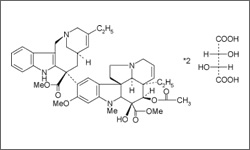Vinorelbine

Vinorelbine (Navelbine®) is a relatively new vinca alkaloid discovered in the mid-1990s by the Pierre Fabre Company. It is a semi synthetic derivative of vinblastine and like the other vinca alkaloids, it is derived from compounds produced by a species of the periwinkle plant, Vinca rosea. Vinorelbine is approved for use in non-small cell lung cancer, breast cancer and ovarian cancer. It is administered weekly intravenously. The dosage used is based on the disease being treated, the patient's size and other drugs being used at the same time. 1
- 1 Chu, E., & DeVita, V. T. (2015). Physicians' cancer chemotherapy drug manual 2015. Burlington, MA: Jones & Bartlett Learning.
Vinca alkaloids are cell cycle specific agents that block cells in metaphase of mitosis. The vinca alkaloids bind to tubulin monomers inhibiting the formation of microtubules, which typically assemble during mitosis. Without adequate numbers of functional microtubules, the newly replicated chromosomes can not be separated and cell division is blocked. The aborted cell division process triggers cell death, and in turn inhibits the production of proteins by DNA and RNA.1
- 1 Chu, E., & DeVita, V. T. (2015). Physicians' cancer chemotherapy drug manual 2015. Burlington, MA: Jones & Bartlett Learning.
The side effects and toxicity of vinorelbine are generally milder than other vinca alkaloids. However, various side effects do frequently occur with treatment. Common side effects include myelosuppression, which results in a reduced number of platelets, red blood cells and white blood cells, nausea and vomiting, shortness of breath, constipation or loose stools, alopecia (hair loss), numbness in the hands or feet.1
- 1 Chu, E., & DeVita, V. T. (2015). Physicians' cancer chemotherapy drug manual 2015. Burlington, MA: Jones & Bartlett Learning.
